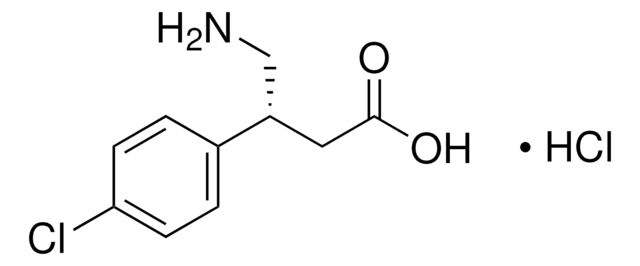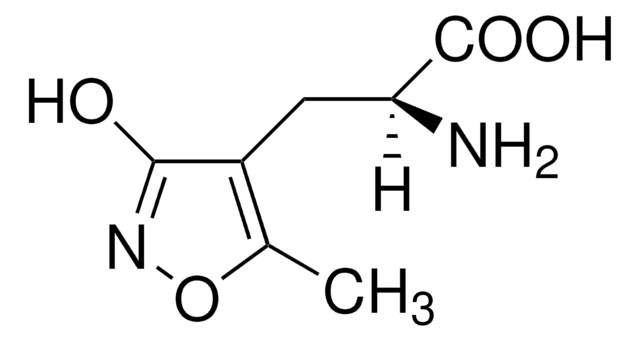M1523
Muscimol
≥98% (TLC), powder, GABAA receptor agonist.
Synonym(s):
3-Hydroxy-5-aminomethyl-isoxazole, 5-Aminomethyl-3-hydroxy-isoxazole, 5-Aminomethyl-3-isoxazolol, Agarine, Pantherine
About This Item
Recommended Products
product name
Muscimol, powder
form
powder
Quality Level
color
white to off-white
storage temp.
2-8°C
SMILES string
NCC1=CC(=O)NO1
InChI
1S/C4H6N2O2/c5-2-3-1-4(7)6-8-3/h1H,2,5H2,(H,6,7)
InChI key
ZJQHPWUVQPJPQT-UHFFFAOYSA-N
Gene Information
rat ... Gabra2(29706)
Looking for similar products? Visit Product Comparison Guide
General description
Application
- to reduce conditioned fear-expression in lateral amygdala (LA)
- to eliminate cortical cell response in ferrets
- to inactivate lateral magnocellular nucleus of the nidopallium (LMAN) in zebra finches
Biochem/physiol Actions
Features and Benefits
Signal Word
Danger
Hazard Statements
Precautionary Statements
Hazard Classifications
Acute Tox. 2 Oral - STOT SE 3
Target Organs
Central nervous system
Storage Class Code
6.1A - Combustible acute toxic Cat. 1 and 2 / very toxic hazardous materials
WGK
WGK 3
Flash Point(F)
Not applicable
Flash Point(C)
Not applicable
Personal Protective Equipment
Certificates of Analysis (COA)
Search for Certificates of Analysis (COA) by entering the products Lot/Batch Number. Lot and Batch Numbers can be found on a product’s label following the words ‘Lot’ or ‘Batch’.
Already Own This Product?
Find documentation for the products that you have recently purchased in the Document Library.
Customers Also Viewed
Articles
DISCOVER Bioactive Small Molecules for Neuroscience
DISCOVER Bioactive Small Molecules for Neuroscience
DISCOVER Bioactive Small Molecules for Neuroscience
DISCOVER Bioactive Small Molecules for Neuroscience
Our team of scientists has experience in all areas of research including Life Science, Material Science, Chemical Synthesis, Chromatography, Analytical and many others.
Contact Technical Service












